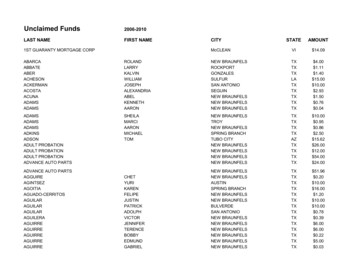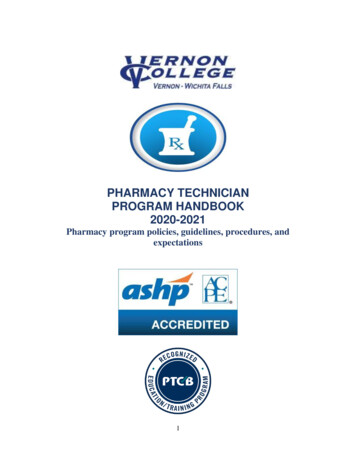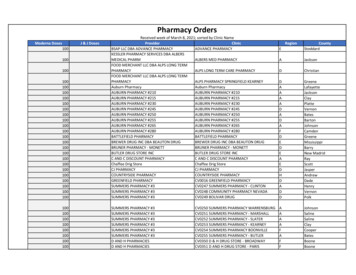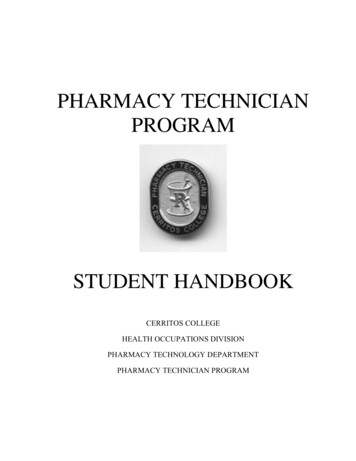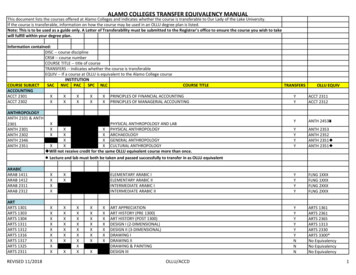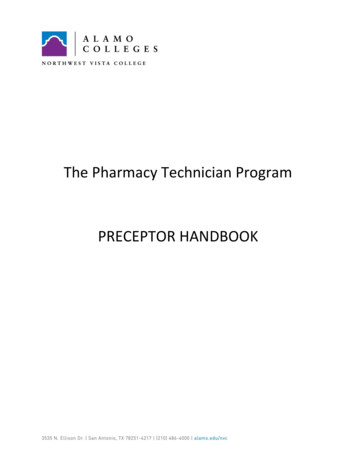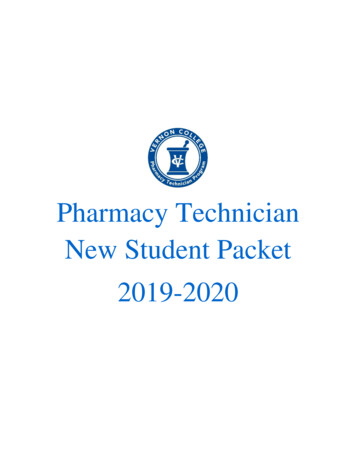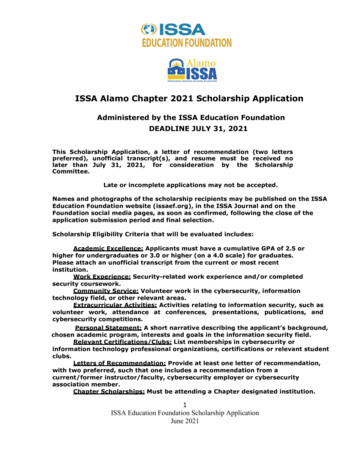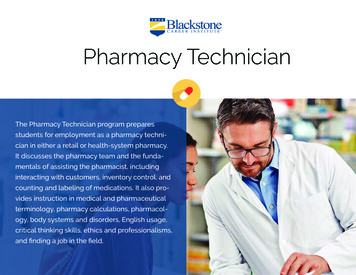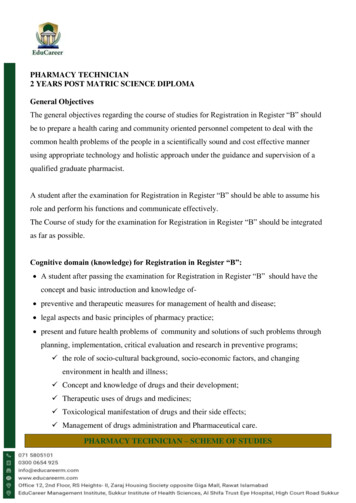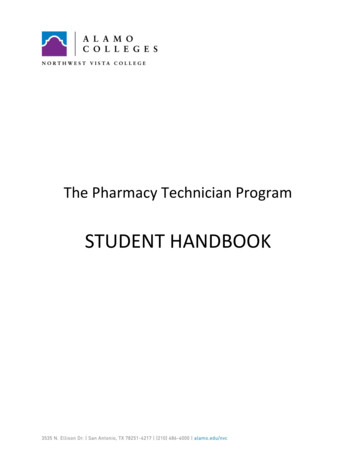
Transcription
The Pharmacy Technician ProgramSTUDENT HANDBOOK
Northwest Vista CollegePharmacy Technician Student HandbookV2 5/9/13P a g e 2Table of XXIV.WelcomeIntroductionThe Pharmacy TechnicianEmployment ProspectsProgram PhilosophyAccreditation StandardPharmacy Technician Program GoalsPharmacy Technician: Entry Level ProficienciesProfessional Ethics and ConfidentialitySCANS CompetenciesAdmission RequirementsTechnical Standards and Essential FunctionsCriminal Background ChecksImmunizationsProgram LengthPharmacy Technician CurriculumCore CoursesAttendance PolicyGrading and Academic RequirementsProgram ProgressionProgressive DisciplineStudent Complaint ProcedureProfessional RisksInsuranceMedical Professional Liability InsuranceBlood and Body Substance ExposureHIPAASubstance Abuse PolicyProfessional BehaviorSafe Clinical PracticePhysical Risk StatementPharmacy Practicum EligibilityPracticum Dress CodeStudent Financial Aidp. 3p. 3p. 4p. 5p. 6p. 6p. 6p. 9p. 10p. 13p. 13p. 13p. 16p. 16p. 16p. 17p. 17p. 19p. 20p. 21p. 21p. 23p. 23p. 24p. 24p. 25p. 25p. 26p. 27p. 28p. 29p. 30p. 30p. 31
Northwest Vista CollegePharmacy Technician Student HandbookV2 5/9/13P a g e 3WelcomeWelcome to the Pharmacy Technician Program. The faculty and staff wish you success in the pursuit ofyour educational goals.The Northwest Vista College Pharmacy Technician Program Student Handbook has been compiled by thefaculty to provide information pertinent to students enrolled in the Pharmacy Technician Program.This handbook contains policies, regulations, procedures, and general course content effective at thetime of publication. Northwest Vista College reserves the right to make changes at any time to reflectcurrent Board policies, administrative regulations and procedures, and applicable State and Federalregulations. Each Student is responsible for knowing the rules, regulations, requirements, and academicpolicies of Northwest Vista College. The college catalog and student handbook are the primary sourcesavailable to students outlining the responsibilities of the college and student. The catalog and handbookare available here.The Alamo Colleges do not discriminate on the basis of race, religion, color, national origin, sex, age, ordisability with respect to access, employment programs, or services. Inquiries or complaints concerningthese matters should be brought to the attention of: Director of Employee Services, Title IX Coordinator,(210) 485-0200. Address: Human Resources Department, 201 W. Sheridan, Bldg. A, San Antonio, Texas78204. For special accommodations or an alternate format, contact the Northwest Vista College Accessoffice at (210) 486-4466.IntroductionYou have chosen to pursue a career in pharmacy as a Pharmacy Technician. The role of a PharmacyTechnician is exciting, challenging, and rewarding. Pharmacy Technicians assist pharmacists in dailyfunctions that do not require the professional judgment of the pharmacist. The role of a pharmacytechnician is filled with responsibility. In fact, the level of responsibility cannot be stressed sufficientlyfor you to fully realize its scope, and you will be faced with it constantly as you go about your dailyfunctions. The Student Handbook has been prepared to help you learn and understand some of theseresponsibilities that apply directly to you as a student Pharmacy Technician.One very important word that you should understand now is ethics. Ethics is a mode of conduct andbehavior. A pattern of proper conduct at all times is essential in persons desiring a career in anyprofession. The ethical responsibilities associated with a career in health care make it necessary forthose practicing in this domain to carefully consider all of their actions both on and off duty.It is absolutely essential that all members of the medical team understand that the patient comes first!The regulations embodied in this handbook were all written with this thought in mind. Each student
Northwest Vista CollegePharmacy Technician Student HandbookV2 5/9/13P a g e 4should realize that the contents of the manual are not intended to be discriminatory to anyone.Furthermore, the contents are those policies, regulations, and procedures now in effect. The Collegereserves the right to make changes at any time to reflect current Board policies, administrativeregulations and procedures, and amendments by state law. Students are urged to study the contents ofthis handbook carefully, for they are responsible for observing the regulations contained herein. Anyquestion or comments concerning material in the Student Handbook should be addressed to theProgram Coordinator.During the first few weeks and months in this training program, you will need to learn cooperation.Your first and closest associates will be your colleagues—those fellow students who occupy the desksaround you. As a member of the class, it is your immediate responsibility to work together. You willneed to accept the attitudes and ideals of some class members that are very much different from yourown. Whenever there is discontentment or disharmony within the class, the goals of the class cannotbe reached successfully. A student who can discuss, demonstrate, and debate in the proper manner isan individual who will learn. In any profession, in order to be successful, a person must be able to listen,ask questions, express opinions, correct mistakes, and make use of his or her abilities. Try and keepyour relationship with your colleagues on an equal level. Help each other. Discuss and solve yourproblems together. A competitive atmosphere is desirable because competitiveness propagatessuccess.Again, welcome to the Pharmacy Technician Program. We hope that you will find the Program to be funand exciting as you obtain the skills and knowledge needed to be a successful Pharmacy Technician.The Pharmacy TechnicianThe primary role of any person within the profession of pharmacy is to ensure that patients receive thecorrect drug therapy for their medical condition. The Pharmacy Technician is responsible for assistingthe pharmacist in providing this care by performing tasks that do not require the professional judgmentof a pharmacist and can be reviewed by a pharmacist to ensure accuracy. The role of the pharmacytechnician is vital to the future of pharmacy because the pharmacy technician can perform duties whichwill allow the pharmacist more time to spend delivering patient care.Some of the roles of the Pharmacy Technician found in the Manual for Pharmacy Technicians, SecondEdition include:Information Management Assist with drug use evaluations Collect data for drug therapy monitoring activitiesMedication Preparation Compound and reconstitute medications Perform mathematical calculations Prepare parenteral nutrient solutions and antineoplastic agentsMedication Dispensing Certify the complete drug order/prescription
Northwest Vista CollegePharmacy Technician Student HandbookV2 5/9/13P a g e 5 Fill and price outpatient prescriptionsMedication Inventory Management Control pharmacy purchases and inventoryTraining Train other techniciansThe practice of pharmacy is changing to meet the needs of a changing world. As a result, the role of thePharmacy Technician is changing. Pharmacy Technicians are being relied upon more and more toperform the routine, day-to-day functions in the pharmacy so that the pharmacist can spend more timeexpanding and adapting their practice to meet the needs of their patients. Today, Pharmacy Technicianscan expect to find excellent employment opportunities in a variety of settings in San Antonio,surrounding areas and throughout the United States, good pay, and the chance for advancement andnew opportunities.In addition, a national certification exam has been created for Pharmacy Technicians. PharmacyTechnicians who pass the national exam earn the title Certified Pharmacy Technician (CPhT).Certification demonstrates to potential employers that you have mastered a specific body of knowledgeand skills relating to pharmacy. The national Pharmacy Technician Certification Exam is administered bythe Pharmacy Technician Certification Board (PTCB). An exam schedule and PTCB contact informationcan be found at the Pharmacy Technician Certification Board website.Effective June 1, 2004 all pharmacy technicians in Texas must be registered with the Texas State Boardof Pharmacy. In order to become registered, a pharmacy technician must first become certified.Information regarding certification and registration will be covered in Introduction to Pharmacy. Moreinformation about the Texas State Board of Pharmacy is located here.Pharmacy Technicians may also become involved in a variety of national, state, and local organizations.Students are strongly encouraged, but not required, to become members of at least one professionalorganization. Benefits of membership may include receiving newsletters, journals, mailings, andcontinuing education. Members can also vote on various issues at the national, state, and local levels,which will impact the future of pharmacy. Additional information on organizational membership, alongwith applications, can be obtained from the Pharmacy Technician Program Coordinator.Employment ProspectsEmployment in almost every aspect of the healthcare industry is projected to grow at a steady rate forthe foreseeable future. According to a May 2011 Bureau of Labor Statistics report, the national averagesalary for a pharmacy technician was 30,020 annually. The majority of pharmacy technicians (18.79%)were employed in a retail setting, such as a grocery store pharmacy or national retail pharmacy. To viewthe report in its entirety, include individual state statistics, please follow this link.
Northwest Vista CollegePharmacy Technician Student HandbookV2 5/9/13P a g e 6Program PhilosophyThe Program is committed to serving students and the pharmaceutical community through guidance,excellent academic instruction and professional training utilizing traditional and innovative means whileunderstanding the cultural diversity of individuals. NVC strives to maintain a student-centeredphilosophy, and utilize community and educational resources for student success.Accreditation StandardThe Pharmacy Technician Program is accredited by the American Society of Health System Pharmacists(ASHP). On December 15th, 2012, a site visit team from ASHP visited Northwest Vista College toevaluate the Pharmacy Technician Training Program. During the site visit, students and graduates wereinterviewed to provide information to the surveyors regarding their experiences in the Program.Accreditation can be granted for up to six years from the date of the application. Northwest VistaCollege received full accreditation through 2018. As an accredited program, the Pharmacy TechnicianProgram will undergo continuous reevaluation, which includes written reports at least every three yearsand reexamination by site visit at least every six years.The purpose of gaining accreditation is to demonstrate that the Training Program meets or exceeds therequirements of the Standard. As a student and graduate of a training program, accreditation isimportant for several reasons. First, accreditation ensures that you are receiving training and skills thatreflect the national standard. Second, employers will know that the education and training you receivedmeets the Standard’s criteria. Finally, accredited programs must constantly work to remain up-to-dateon pharmacy practice trends. Because of this continuous evaluation process, students can be sure thatthey are learning the most current information available relating to pharmacy.Pharmacy Technician Program GoalsThe Pharmacy Technician Program goals are based on the objectives found in the “ASHP AccreditationStandard for Pharmacy Technician Training Programs, Part VII.” After each goal statement, the course(s)in which the goal is an objective will be listed. During the Pharmacy Training Program, the followingobjectives will be covered:1. Assist the pharmacist in collecting, organizing, and evaluating information for direct patientcare, medication use review, and departmental management.Applicable Courses: PHRA 1301, 1313, 1349, 21642. Receive and screen prescriptions/medication orders for completeness and authenticity.Applicable Courses: PHRA 1301, 1313, 1349, 21643. Prepare medications for distribution.Applicable Courses: PHRA 1313, 1349, 1345, 2164
Northwest Vista CollegePharmacy Technician Student HandbookV2 5/9/13P a g e 74. Verify the measurements, preparation, and/or packaging of medications produced by othertechnicians.Applicable Courses: PHRA 1209, 1313, 1349, 1345, 21645. Distribute medications.Applicable Courses: PHRA 1313, 1349, 1345, 21646. Assist the pharmacist in the administration of immunizations.Applicable Courses: PHRA 1313, 21647. Assist the pharmacist in the identification of patients who desire/require counseling tooptimize the use of medications, equipment, and devices.Applicable Courses: PHRA 1301, 1443, 1349, 21648. Initiate, verify, assist in the adjudication of, and collect payment and/or initiate billing forpharmacy services and goods.Applicable Courses: PHRA 1313, 1349, 21649. Purchase pharmaceuticals, devices, and supplies according to an established purchasingprogram.Applicable Courses: PHRA 1313, 1349, 216410. Control the inventory of medications, equipment, and devices according to an established plan.Applicable Courses: PHRA 1313, 1349, 216411. Assist the pharmacist in monitoring the practice site and/or service area for compliance withfederal, state, and local laws; regulations; and professional standards.Applicable Courses: PHRA 1301, 1313, 1349, 1345, 216412. Maintain pharmacy equipment and facilities.Applicable Courses: PHRA 1313, 1349, 1345, 216413. Assist the pharmacist in preparing, storing, and distributing investigational medicationproducts.Applicable Courses: PHRA 1349, 216414. Assist the pharmacist in the monitoring of medication therapy.Applicable Courses: PHRA 1313, 1349, 1441, 216415. Participate in the pharmacy department’s process for preventing medication misadventures.Applicable Courses: PHRA 1313, 1349, 1345, 216416. Take personal responsibilities for assisting the pharmacist in improving direct patient care.Applicable Courses: PHRA 1313, 1349, 1441, 2164
Northwest Vista CollegePharmacy Technician Student HandbookV2 5/9/13P a g e 817. Display ethical conduct in all job-related activities.Applicable Courses: PHRA 1301, 1313, 1349, 1345, 216418. Maintain an image appropriate for the profession of pharmacy.Applicable Courses: PHRA 1301, 1209, 1313, 1349, 1441, 1345, 216419. Resolve conflicts through negotiation.Applicable Courses: PHRA 1301, 1209, 1313, 1349, 1441, 1345, 216420. Understand the principles for managing change.Applicable Courses: PHRA 1301, 1209, 1313, 1349, 1441, 1345, 216421. Appreciate the need to adapt direct patient care to meet the needs of diversity.Applicable Courses: PHRA 1301, 1313, 1349, 1441, 216422. Appreciate the benefits of active involvement in local, state, and national technician and otherpharmacy organizations.Applicable Courses: PHRA 1301, 1313, 1349, 216423. Appreciate the value of obtaining technician certification.Applicable Courses: PHRA 1301, 216424. Understand the importance of and resources for staying current with changes in pharmacypractice.Applicable Courses: PHRA 1301, 1209, 1313, 1349, 1441, 1345, 216425. Communicate clearly when speaking and or in writing.Applicable Courses: PHRA 1301, 1209, 1313, 1349, 1441, 1345, 216426. Maximize work efficiency through the use of technology.Applicable Courses: PHRA 1301, 1209, 1313, 1349, 1441, 1345, 216427. Efficiently solve problems commonly encountered in one’s own work.Applicable Courses: PHRA 1301, 1209, 1313, 1349, 1441, 1345, 216428. Display a caring attitude toward patients in all aspects of job responsibilities.Applicable Courses: PHRA 1301, 1313, 1349, 1441, 216429. Maintain confidentiality of patient and proprietary business information.Applicable Courses: PHRA 1301, 1313, 1349, 216430. Understand direct patient care delivery systems in multiple practice settings.Applicable Courses: PHRA 1301, 1313, 1349, 2164
Northwest Vista CollegePharmacy Technician Student HandbookV2 5/9/13P a g e 931. Efficiently manage one’s work whether performed alone or as part of a team.Applicable Courses: PHRA 1301, 1209, 1313, 1349, 1441, 1345, 216432. Function effectively as a member of the health care team.Applicable Courses: PHRA 1301, 1209, 1313, 1349, 1441, 1345, 216433. Balance obligations to one’s self, relationships, and work in a way that minimizes stress.Applicable Courses: PHRA 1301, 1209, 1313, 1349, 1441, 1345, 216434. Understand the use and side effects of prescription and nonprescription medications used totreat common disease states.Applicable Courses: PHRA 1313, 1349, 1441, 216435. Assist the pharmacist in assuring the quality of all pharmaceutical services.Applicable Courses: PHRA 1301, 1209, 1313, 1349, 1441, 1345, 2164During the second semester of the Program, the Pharmacy Practicum will evaluate the student’scompetence in each of these areas while the student completes rotations in various pharmacysettings. Upon graduation, students will have demonstrated competency in each of the PharmacyTechnician Program Goal areas.Pharmacy Technician: Entry-Level ProficienciesThe following proficiencies are those determined by the American Society of Health-System Pharmacistspublished in the Practice Standards of ASHP.Upon completion of the program:I.The technician should demonstrate appropriate knowledge and understanding of pharmacy’srole in the health-care industry, including quality improvement processes that may be used tomonitor pharmacy’s ability to fulfill its responsibilities within a given health-care system.II.The technician should have a thorough knowledge and understanding of the duties andresponsibilities of pharmacy technicians, including standards of ethics governing pharmacypractice.III.The technician should have a working knowledge of the pharmaceutical and medical terms,abbreviations, and symbols commonly used in the prescribing, dispensing, administering, andcharting of medications in the institution.IV.The technician should have a working knowledge of the general chemical and physicalproperties of drugs handled in the manufacturing and packaging operations used in the deliveryof pharmaceutical services.
Northwest Vista CollegePharmacy Technician Student HandbookV2 5/9/13P a g e 10V.The technician should be able to perform the arithmetical calculations required for the usualdosage determinations and solution preparation.VI.The technician should be able to perform the essential functions relating to drug purchasing andinventory control.VII.The technician should demonstrate a working knowledge of drug dosages, routes ofadministration, and mechanical, automatic, or robotic drug delivery systems.VIII.The technician should have a working knowledge of the procedures and operations relating tothe manufacturing, packaging, and labeling of drug products.IX.The technician should have a working knowledge of the procedures and operations relating toaseptic compounding and parenteral admixture operations.X.The technician should exhibit the ability to perform the usual technician functions associatedwith contemporary drug distribution systems.XI.The technician should be able to perform the manipulative and recordkeeping functionsassociated with the dispensing of prescriptions for ambulatory patients, including thecompletion of universal insurance claim forms when necessary.Professional Ethics and ConfidentialityStudents must remember at all times that the information in a pharmacy is confidential. Students shallnot tell patients, parents, friends, relatives, or non-pharmacy employees any information regarding theprescription(s) a patient receives.A Pharmacy Technician works under the supervision of a licensed pharmacist, and is responsible forperforming activities that do not require the professional judgment of the pharmacist or can beevaluated by a pharmacist for accuracy. Since Pharmacy Technicians assist pharmacists in providingpatient care, student Pharmacy Technician should comply with the following “Code of Ethics forPharmacists” that is published in Practice Standards of ASHP:Code of Ethics for PharmacistsPreamblePharmacists are health professionals who assist individuals in making the best use of medications.This Code, prepared and supported by pharmacists, is intended to state publicly the principles thatform the fundamental basis of the roles and responsibilities of pharmacists. These principles, basedon moral obligations and virtues, are established to guide pharmacists in relationships withpatients, health professionals, and society.
Northwest Vista CollegePharmacy Technician Student HandbookV2 5/9/13P a g e 11PrinciplesA pharmacist respects the covenantal relationship between the patient and the pharmacist.Interpretation: Considering the patient-pharmacist relationship as a covenant means that apharmacist has moral obligations in response to the gift of trust received from society. In return forthis gift, a pharmacist promises to help individuals achieve optimum benefit from theirmedications, to be committed to their welfare, and to maintain their trust.A pharmacist promotes the good of every patient in a caring, compassionate, and confidentialmanner.Interpretation: A pharmacist places concern for the well being of the patient at the center ofprofessional practice. In doing so, a pharmacist considers needs stated by the patient as well asthose defined by health science. A pharmacist is dedicated to protecting the dignity of the patient.With a caring attitude and a compassionate spirit, a pharmacist focuses on serving the patient in aprivate and confidential manner.A pharmacist respects the autonomy and dignity of each patient.Interpretation: A pharmacist promotes the right of self-determination and recognizes individualself-worth by encouraging patients to participate in decisions about their health. A pharmacistcommunicates with patients in terms that are understandable. In all cases, a pharmacist respectspersonal and cultural differences among patients.A pharmacist acts with honesty and integrity in professional relationships.Interpretation: A pharmacist has a duty to tell the truth and to act with conviction of conscience. Apharmacist avoid discriminatory practices, behavior or work conditions that impair professionaljudgement, and actions that compromise dedication to the best interest of patients.A pharmacist maintains professional competence.Interpretation: A pharmacist has a duty to maintain knowledge and abilities as new medications,devices, and technologies become available and as health information advances.A pharmacist respects the values and abilities of colleagues and other health professionals.Interpretation: When appropriate, a pharmacist asks for the consultation of colleagues or otherhealth professionals or refers the patient. A pharmacist acknowledges that colleagues and otherhealth professionals may differ in the beliefs and values they apply to the care of the patient.A pharmacist serves individual, community, and societal needs.Interpretation: The primary obligation of a pharmacist is to individual patients. However, theobligations of a pharmacist may at times extend beyond the individual to the community andsociety. In these situations, the pharmacist recognizes the responsibilities that accompany theseobligations and acts accordingly.
Northwest Vista CollegePharmacy Technician Student HandbookV2 5/9/13P a g e 12A pharmacist seeks justice in the distribution of health resources.Interpretation: When health resources are allocated, a pharmacist is fair and equitable, balancingthe needs of patients and society.In addition, the American Association of Pharmacy Technicians has a Code of Ethics specifically forPharmacy Technicians. Pharmacy Technician students should become familiar with the following andimplement the principles in their daily practice as a pharmacy technician:Code of Ethics for Pharmacy TechniciansPreamblePharmacy technicians are healthcare professionals who assist pharmacists in providing the bestpossible care for patients. The principles of this code which apply to pharmacy technicians workingin all settings, are based on the application and support of the moral obligations that guide all in thepharmacy profession in relationships with patients, healthcare professionals, and society.PrinciplesA pharmacy technician’s first consideration is to ensure the health and safety of the patient, and touse knowledge and skills most capably in serving others.A pharmacy technician supports and promotes honesty and integrity in the profession, whichincludes a duty to observe the law, maintain the highest moral and ethical conduct at all times, anduphold the ethical principles of the profession.A pharmacy technician assists and supports the pharmacist in the safe, efficacious, and costeffective distribution of health services, and healthcare resources.A pharmacy technician respects and values the abilities of pharmacists, colleagues, and otherhealthcare professionals.A pharmacy technician maintains competency in practice, and continually enhances professionalknowledge and expertise.A pharmacy technician respects and supports the patient’s individuality, dignity, andconfidentiality.A pharmacy technician respects the confidentiality of a patient’s records and discloses pertinentinformation only with proper authorization.A pharmacy technician never assists in the dispensing, promoting, or distributing of medications ormedical devices that are not of good quality or do not meet the standards required by law.A pharmacy technician does not engage in any activity that will discredit the profession, and willexpose, without fear or favor, illegal or unethical conduct in the profession.
Northwest Vista CollegePharmacy Technician Student HandbookV2 5/9/13P a g e 13A pharmacy technician associates and engages in the support of organizations that promote theprofession of pharmacy through the use and enhancement of pharmacy technicians.Failure to comply with the above is cause for immediate dismissal from the program.Personal relationships with clinical personnel are strongly discouraged.SCANS CompetenciesIn 1990, the U.S. Department of Labor established the Secretary’s Commission on Achieving NecessarySkills (SCANS) to examine the demands of the workplace and whether our nation’s students are capableof meeting those demands. The Commission determined that today’s jobs generally requirecompetencies in the following areas:A. Resources: Identifies, organizes, plans and allocates resourcesB. Interpersonal: Works with othersC. Information: Acquires and uses informationD. Systems: Understands complex interrelationshipsE. Technology: Works with a variety of technologiesThe Texas Higher Education Coordinating Board requires that all degree plans in institutions of highereducation incorporate these competencies and identify to the student how these competencies areachieve in course objectives. The specific competencies and objectives for each course will be includedin the course syllabus.Admission RequirementsApplicants accepted into the Program must satisfactorily meet the following requirements: Math Assessment or equivalent college coursework Reading Assessment or equivalent college coursework Immunizations Criminal background checkTechnical Standards and Essential FunctionsThe following technical standards and essential functions outline reasonable expectations of a student inthe Pharmacy Technician Program for the performance of common pharmacy technician functions. Thepharmacy technician student must be able to apply the knowledge and skills necessary to function in avariety of classroom, lab and/or clinical situations while providing the essential competencies ofpharmacy technicians. These requirements apply for the purpose of admission and continuation in theprogram.
Northwest Vista CollegePharmacy Technician Student HandbookV2 5/9/13P a g e 14The student must demonstrate the following abilities:Essential Functions: Observation Definition: Ability to participate actively in all demonstrations, laboratory exercise, and clinicalexperiences in the professional program component and to assess and comprehend thecondition of all clients assigned to him/her for examination, diagnosis, and treatment. Suchobservation and information usually requires functional use of visual, auditory, and somaticsensations.Technical StandardVisual (Corrected as necessary)Able to visually discriminate increment readings on syringesAble to read instrument scalesAble to enter and review data during use of computer equipmentAble to visually discriminate different colored and shaped objectsRecognize and interpret facial expressions and body languageAssess the environment at a distanceAuditory (corrected as necessary)Recognize and respond to soft voices or voices under protective garbRecognize and respond to voices over the telephone, via a speaker, or from microphone speakerin a drive-thru.Essential Functions: Communication Definition: Ability to communicate effectively in English using verbal, non-verbal and writtenformats with faculty, other students, clients, families and all members of the healthcare team.Technical StandardAble to elicit informationAssess nonverbal communicationsTransmit information to clients, fellow students, faculty and staff, and members of the healthcare teamReceive, write and interpret written communication in both academic and clinical settingsEssential Functions: MotorDefinition: Sufficient motor
The Pharmacy Technician Program goals are based on the objectives found in the “ASHP Accreditation Standard for Pharmacy Technician Training Programs, Part VII.” After each goal statement, the course(s) in which the goal is an objective will be listed. During the
